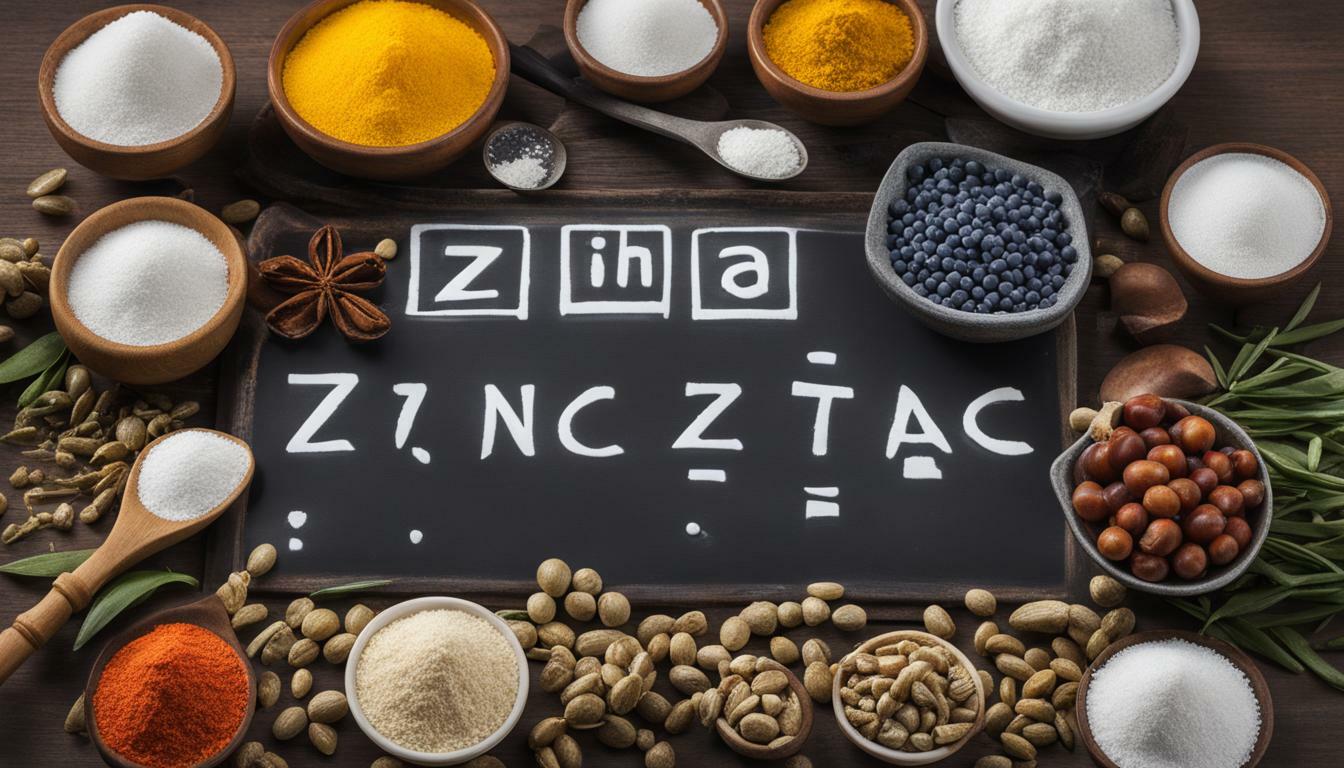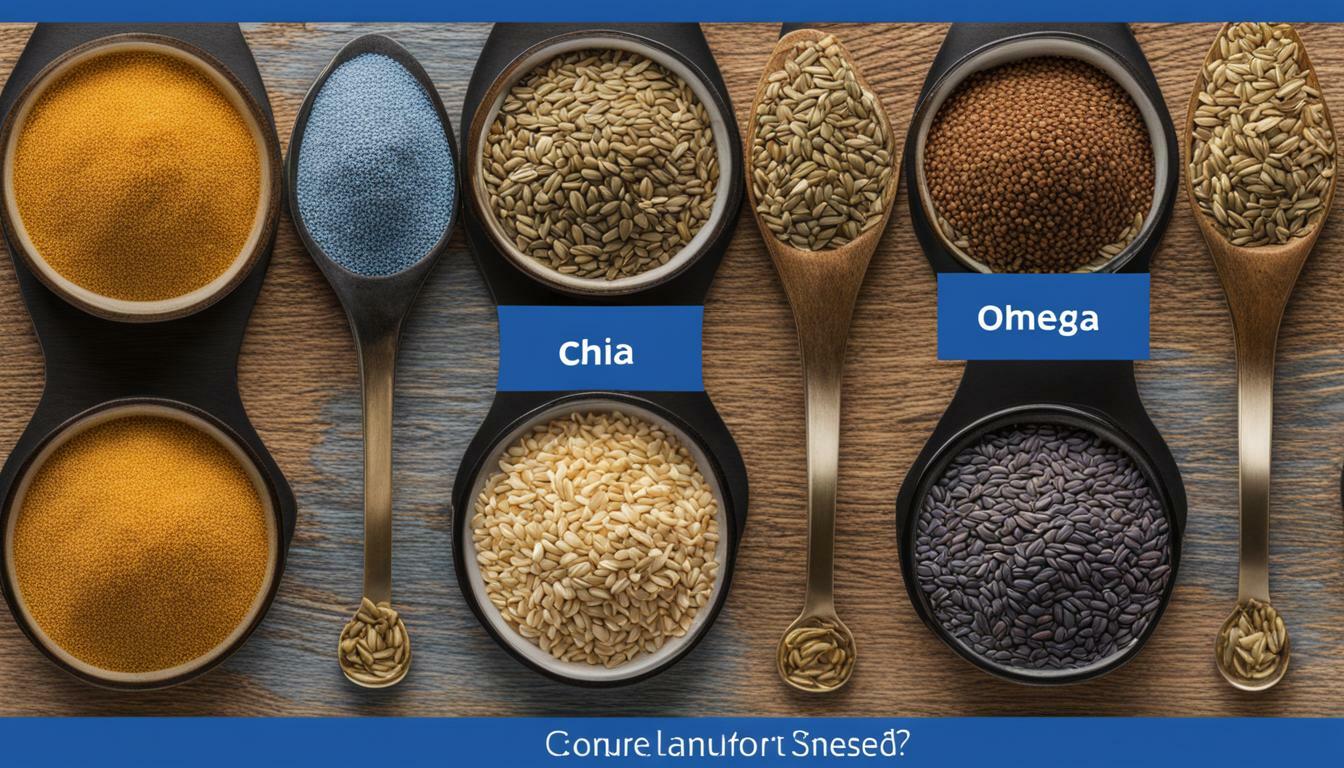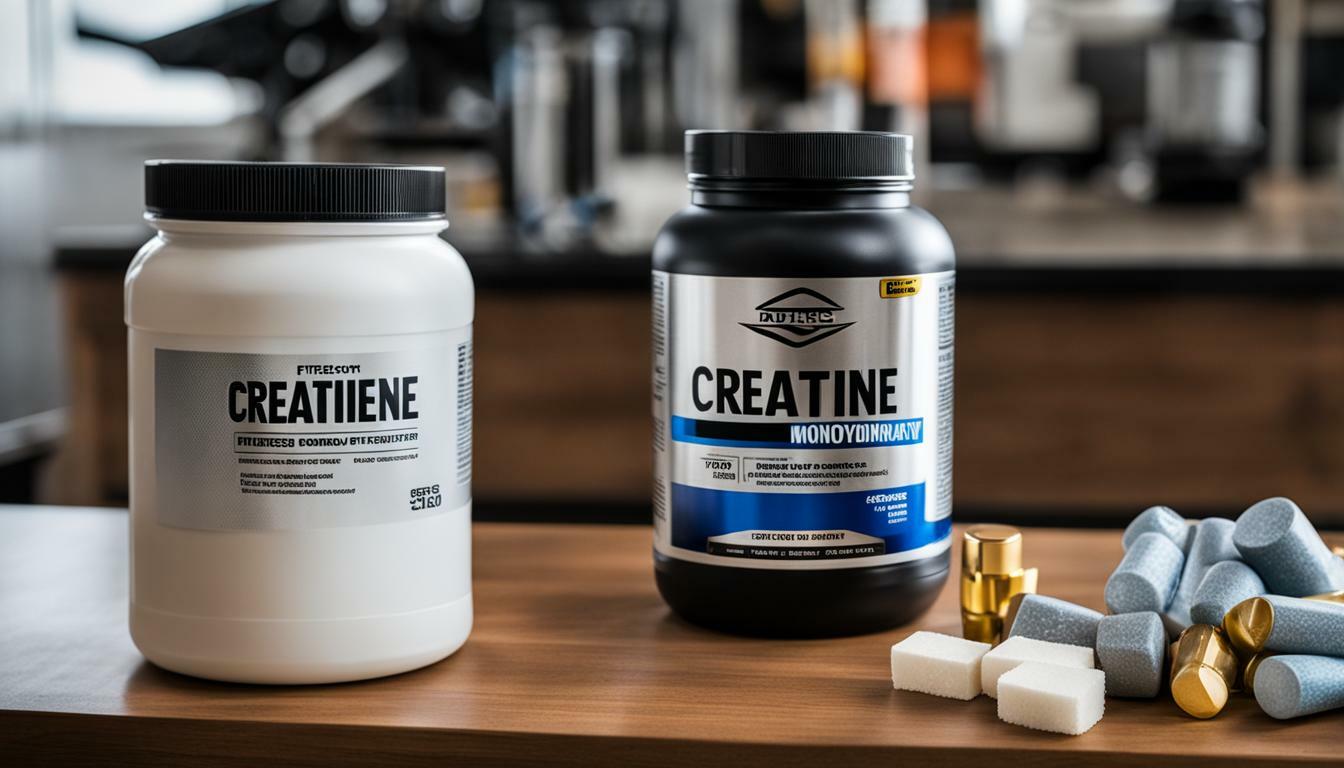Zinc citrate and zinc gluconate are two different forms of zinc supplements that offer various benefits to overall health and well-being. Zinc, an essential mineral, plays a crucial role in numerous bodily functions, including immune support, wound healing, and DNA synthesis.
Key Takeaways:
- Zinc citrate and zinc gluconate are different forms of zinc supplements.
- Zinc citrate is commonly used in cold remedies, while zinc gluconate is known to reduce the severity of acne.
- Zinc picolinate may be better absorbed than other forms of zinc.
- The recommended daily dosage of elemental zinc for adults is typically 15-30 mg.
- Excessive consumption of zinc supplements can cause side effects, so it’s important not to exceed the recommended upper limit of 40 mg per day.
Sources of Zinc Citrate and Zinc Gluconate
Both zinc citrate and zinc gluconate can be found in different forms, such as lozenges, nasal sprays, and other dietary supplements. These mineral forms of zinc offer convenient ways to incorporate this essential nutrient into your daily routine.
Zinc citrate is a type of zinc supplement that is commonly used in cold remedies like lozenges and nasal sprays. It is known for its ability to support immune health and help reduce the duration and severity of cold symptoms. Zinc citrate is easily absorbed by the body and is often recommended for individuals who have difficulty absorbing other forms of zinc.
Zinc gluconate, on the other hand, is also commonly found in cold lozenges and is known for its potential to reduce the severity of acne. It is a widely available form of zinc and is often used as a dietary supplement. While zinc gluconate is generally well-tolerated, it is important to follow the recommended dosage guidelines to avoid any potential side effects.
When choosing between zinc citrate and zinc gluconate, it is important to consider your specific needs and preferences. Both forms offer unique benefits and can be effective in supporting overall health. If you have any concerns or questions about which form of zinc supplement is right for you, it is best to consult with a healthcare professional.
| Zinc Mineral Form | Common Uses |
|---|---|
| Zinc Citrate | Cold remedies, immune support |
| Zinc Gluconate | Cold remedies, acne reduction |
Benefits of Zinc Citrate
Zinc citrate offers several health benefits, including supporting immune function, promoting wound healing, and aiding in the metabolism of carbohydrates, proteins, and fats. As an essential mineral, zinc plays a crucial role in maintaining the overall health and well-being of the body. It is involved in various enzymatic reactions and acts as a cofactor for numerous enzymes.
One of the key benefits of zinc citrate is its role in supporting a healthy immune system. It helps in the production and activation of immune cells, which play a vital role in defending the body against infections and diseases. Zinc also acts as an antioxidant, helping to protect cells from damage caused by harmful free radicals.
Another important benefit of zinc citrate is its ability to promote wound healing. It plays a crucial role in the production and synthesis of collagen, a protein that is necessary for the repair and regeneration of skin tissues. Additionally, zinc citrate helps to reduce inflammation and enhance the body’s natural healing processes.
Furthermore, zinc citrate is involved in the metabolism of carbohydrates, proteins, and fats. It helps to break down these macronutrients and convert them into usable energy for the body. Zinc also plays a role in maintaining healthy hormone levels and supports optimal growth and development.
| Zinc Citrate Benefits: |
|---|
| Supports immune function |
| Promotes wound healing |
| Aids in the metabolism of carbohydrates, proteins, and fats |
It is important to note that the benefits of zinc citrate may vary from person to person, and individual needs should be taken into consideration when considering zinc supplementation. It is always recommended to consult with a healthcare professional before starting any new dietary supplement regimen.
Benefits of Zinc Gluconate
Zinc gluconate is known for its ability to reduce the severity of acne and promote healthy skin, while also supporting immune function and overall well-being. It is commonly used in skincare products and is a popular choice for individuals looking to improve their complexion.
One of the key benefits of zinc gluconate is its role in reducing the severity of acne. Studies have shown that zinc supplementation can help regulate oil production in the skin, reduce inflammation, and inhibit the growth of acne-causing bacteria. This can lead to fewer breakouts and improved skin clarity.
In addition to its impact on skin health, zinc gluconate also plays a crucial role in supporting immune function. It helps to activate and strengthen the immune system, making it more effective in fighting off infections and diseases. This is particularly important during cold and flu season, as adequate zinc levels can help reduce the duration and severity of common illnesses.
Quote:
“Zinc is a vital mineral that plays a crucial role in many bodily functions, including cell growth, hormone production, and DNA synthesis. It is essential for overall health and well-being.” – Dr. Anna, Dermatologist
Summary:
- Zinc gluconate is beneficial for reducing the severity of acne and promoting healthy skin.
- It supports immune function and helps fight off infections and diseases.
- Zinc plays a vital role in various bodily functions, including cell growth and hormone production.
In summary, zinc gluconate offers multiple benefits for both skin health and overall well-being. Its ability to reduce acne severity, support immune function, and contribute to various bodily functions make it a valuable supplement for those seeking to enhance their overall health and appearance.
Zinc Absorption Comparison: Zinc Citrate vs Zinc Gluconate
Studies suggest that zinc picolinate may be better absorbed than other forms, including zinc gluconate and zinc citrate. Zinc absorption plays a crucial role in determining the effectiveness of zinc supplementation in supporting overall health. When choosing between zinc citrate and zinc gluconate, it is important to consider their respective absorption rates.
While both zinc citrate and zinc gluconate are readily absorbed by the body, zinc picolinate has been found to have higher bioavailability. This means that a larger percentage of the zinc is absorbed and utilized by the body when in the form of zinc picolinate. This difference in absorption rates may be attributed to the unique chemical structure of zinc picolinate, which allows for better transportation across the intestinal wall.
As a result, individuals who require higher levels of zinc supplementation, such as those with zinc deficiency or certain health conditions, may benefit from choosing zinc picolinate. However, it is important to note that individual responses to different forms of zinc may vary, and consulting with a healthcare professional is recommended to determine the most suitable form of zinc supplementation for specific needs.
| Zinc Supplement | Absorption Rate |
|---|---|
| Zinc Citrate | High |
| Zinc Gluconate | High |
| Zinc Picolinate | Higher |
Overall, while both zinc citrate and zinc gluconate are effective forms of zinc supplementation, studies suggest that zinc picolinate may offer better absorption and bioavailability. However, it is important to prioritize individual needs and consult with a healthcare professional for personalized recommendations. By choosing the most suitable form of zinc supplement and adhering to the recommended dosage, individuals can optimize the benefits of zinc for their overall health and well-being.
Recommended Dosage of Zinc Supplements
The recommended daily dosage for adults typically ranges from 15 to 30 mg of elemental zinc. It is important to note that this dosage refers to the elemental zinc content, which can vary depending on the form of zinc supplement being used. When selecting a zinc supplement, it is crucial to read the label carefully to determine the amount of elemental zinc provided per dose.
Zinc citrate and zinc gluconate are commonly available forms of zinc supplements. Zinc citrate contains a higher percentage of elemental zinc compared to zinc gluconate. For example, a 50 mg dose of zinc citrate typically provides around 15 mg of elemental zinc, while the same dose of zinc gluconate may only provide around 5 mg of elemental zinc. Therefore, it is important to consider the specific form and composition of the supplement when determining the appropriate dosage.
It is also worth mentioning that exceeding the recommended dosage of zinc can have adverse effects. Consuming more than 40 mg of zinc per day can lead to toxicity symptoms such as nausea, vomiting, diarrhea, stomach pain, and flu-like symptoms. It is advisable to consult with a healthcare professional before starting any new supplement regimen or if you have any concerns about zinc supplementation.
Table: Comparison of Zinc Supplement Dosages
| Zinc Supplement Form | Typical Dosage | Elemental Zinc Content |
|---|---|---|
| Zinc Citrate | 50 mg | 15 mg |
| Zinc Gluconate | 50 mg | 5 mg |
In conclusion, when considering zinc supplementation, it is important to follow the recommended dosage guidelines. The typical dosage for adults ranges from 15 to 30 mg of elemental zinc per day. Remember to carefully read the labels of zinc supplements to determine the amount of elemental zinc provided per dose. Exceeding the recommended dosage can lead to adverse effects, so it is always best to consult with a healthcare professional for personalized advice.
Side Effects of Excessive Zinc Consumption
While both zinc citrate and zinc gluconate are generally well-tolerated, excessive consumption can lead to side effects such as nausea, vomiting, diarrhea, stomach pain, and flu-like symptoms. It’s important to adhere to the recommended daily dosage and not exceed the upper limit of 40 mg of elemental zinc per day, unless under medical guidance.
Although zinc is an essential mineral for our health, taking too much can disrupt the delicate balance in our bodies. Excess zinc can interfere with the absorption of other essential nutrients, such as copper and iron. This can lead to deficiencies in these nutrients, which can have negative effects on overall health.
Furthermore, consuming excessive amounts of zinc supplements over a prolonged period may weaken the immune system. While zinc is known for its immune-boosting properties, too much can actually have the opposite effect, suppressing immune function and increasing the risk of infections.
It’s always best to consult with a healthcare professional before starting any new supplementation regimen, especially if you have any pre-existing medical conditions or take medications regularly. They can provide personalized guidance and help you determine the appropriate dosage of zinc supplements for your individual needs.
| Side Effects of Excessive Zinc Consumption |
|---|
| Nausea |
| Vomiting |
| Diarrhea |
| Stomach Pain |
| Flu-like Symptoms |
Importance of Adhering to the Recommended Zinc Intake
It is crucial to adhere to the recommended zinc intake and not exceed the daily upper limit of 40 mg, unless under medical guidance, to avoid potential adverse effects. Zinc is an essential mineral that plays a vital role in various bodily functions, including immune support, wound healing, DNA synthesis, and cell division. While zinc supplementation can provide numerous health benefits, overconsumption can lead to unwanted side effects.
Excessive intake of zinc supplements can result in gastrointestinal issues such as nausea, vomiting, diarrhea, and stomach pain. In some cases, it may also cause flu-like symptoms, including fever, chills, and fatigue. These side effects can significantly impact an individual’s quality of life and well-being.
To ensure optimal health and minimize the risk of adverse effects, it is advisable to follow the recommended daily dosage of zinc supplements. For adults, the typical range is between 15-30 mg of elemental zinc per day. It’s important to note that the elemental zinc content may vary depending on the specific form of zinc supplement used. Therefore, it’s recommended to read product labels carefully and consult with a healthcare professional if needed.
In conclusion, while zinc supplements can offer several health benefits, it is essential to prioritize responsible supplementation. Adhering to the recommended zinc intake and avoiding excessive consumption can help prevent potential side effects and ensure the safe and effective use of these supplements for immune support and overall health.
Choosing the Right Form of Zinc Supplement
When selecting a zinc supplement, consider factors such as desired benefits, availability, and compatibility with existing medications or conditions. Both zinc citrate and zinc gluconate are widely available and offer various health benefits. Zinc citrate is commonly found in cold remedies like lozenges and nasal sprays, making it an ideal choice for boosting the immune system during seasonal illnesses. On the other hand, zinc gluconate is known for its effectiveness in reducing the severity of acne and promoting clearer skin.
It’s important to note that zinc picolinate may be better absorbed by the body compared to other forms of zinc, including zinc gluconate and zinc citrate. This makes it a preferred option for individuals who have difficulty absorbing nutrients or those with specific health concerns. Consulting with a healthcare professional can help determine the most suitable form of zinc supplement based on personal needs and circumstances.
In terms of dosage, the recommended daily amount of elemental zinc for adults is typically between 15-30 mg. It’s important to follow the recommended dosage and avoid exceeding the upper limit of 40 mg per day, unless under medical guidance. Excessive consumption of zinc supplements can lead to side effects such as nausea, vomiting, diarrhea, stomach pain, and flu-like symptoms.
| Zinc Supplement | Main Benefits |
|---|---|
| Zinc Citrate | Boosts immune system, supports overall health |
| Zinc Gluconate | Reduces severity of acne, promotes clearer skin |
Remember, choosing the right form of zinc supplement depends on individual preferences and health goals. By considering factors such as desired benefits, availability, and compatibility with existing medications or conditions, individuals can make informed decisions when incorporating zinc supplements into their daily routine.
Other Forms of Zinc Supplements
In addition to zinc citrate and zinc gluconate, there are other forms of zinc supplements, such as zinc picolinate and zinc oxide, that offer their own unique advantages. These forms of zinc supplements are often used for specific purposes, catering to different health needs.
Zinc Picolinate
Zinc picolinate is a highly bioavailable form of zinc, meaning it is easily absorbed by the body. This form of zinc is often recommended for individuals with digestive issues or malabsorption problems, as it has been shown to have superior absorption compared to other forms of zinc. Additionally, zinc picolinate is known for its potential benefits in supporting immune function and promoting healthy skin.
Zinc Oxide
Zinc oxide is commonly used in skincare products, particularly as a sunscreen ingredient. It offers both UVA and UVB protection and is gentle on the skin, making it suitable for individuals with sensitive skin. In addition to its role in sun protection, zinc oxide may also play a role in wound healing and reducing inflammation.
When considering which form of zinc supplement to choose, it’s important to consult with a healthcare professional to determine the appropriate form and dosage based on individual needs and goals. Additionally, always follow the recommended dosage guidelines and be mindful of potential side effects, particularly when consuming excessive amounts of zinc supplements.
| Zinc Supplement Form | Main Benefits |
|---|---|
| Zinc Citrate | Often used in cold remedies and nasal sprays |
| Zinc Gluconate | Known to reduce the severity of acne |
| Zinc Picolinate | Highly bioavailable, supports immune function and healthy skin |
| Zinc Oxide | Used in sunscreens, aids in wound healing and reduces inflammation |
Incorporating Zinc into a Healthy Lifestyle
While zinc supplements can provide additional support, it’s essential to focus on obtaining zinc through a varied diet that includes zinc-rich foods like meat, seafood, nuts, and whole grains. These natural food sources not only provide zinc but also offer other essential nutrients that contribute to overall health and well-being.
Meat, such as beef, poultry, and pork, is an excellent source of zinc. Opt for lean cuts to keep saturated fat intake in check. Seafood, particularly shellfish like oysters and crab, is also rich in zinc. These options can be enjoyed as part of a balanced diet.
Nuts, particularly cashews, almonds, and peanuts, are not only a delicious snack but also a good source of zinc. Incorporate them into salads, stir-fries, or homemade trail mix for a healthy boost. Whole grains like quinoa, brown rice, and oats are another source of zinc that can be included in meals like breakfast bowls or as a side dish.
In addition to these food sources, it’s important to consider the bioavailability of zinc. Zinc citrate and zinc gluconate supplements are commonly used to ensure adequate zinc intake. However, it’s crucial to follow the recommended dosage and not exceed the upper limit to avoid potential side effects. If in doubt, it’s always best to consult with a healthcare professional before starting any supplementation regimen.
| Zinc-Rich Foods | Zinc Content (per 100g) |
|---|---|
| Beef | 4.8mg |
| Poultry | 2.6mg |
| Pork | 2.9mg |
| Oysters | 16mg |
| Crab | 7.6mg |
| Cashews | 5.6mg |
| Almonds | 3.3mg |
| Peanuts | 3.3mg |
| Quinoa | 1.5mg |
| Brown Rice | 1mg |
| Oats | 2.3mg |
By incorporating zinc-rich foods into your diet, alongside zinc supplements if necessary, you can ensure you’re getting adequate amounts of this essential mineral. Remember, a healthy lifestyle is about balance, so focus on consuming a variety of nutrient-dense foods and maintaining a well-rounded approach to your overall health.
Conclusion
Zinc citrate and zinc gluconate are both valuable forms of zinc supplements, each offering distinct benefits to overall health and well-being. Zinc citrate is commonly used in cold remedies such as lozenges and nasal sprays, while zinc gluconate is often added to cold lozenges and is known for its ability to reduce the severity of acne. Additionally, zinc picolinate may be more readily absorbed by the body compared to other forms of zinc, including zinc gluconate and zinc citrate.
The recommended daily dosage for adults typically ranges from 15 to 30 mg of elemental zinc. Both zinc citrate and zinc gluconate are generally well-tolerated, but it’s important to avoid excessive consumption of zinc supplements, as it can lead to side effects such as nausea, vomiting, diarrhea, stomach pain, and flu-like symptoms. It is advisable not to exceed the recommended upper limit of 40 mg per day, unless under medical guidance.
When considering zinc supplements, it is crucial to make informed choices based on individual needs and preferences. While zinc citrate and zinc gluconate are popular options, there are other forms of zinc supplements available in the market as well. Incorporating zinc into a balanced diet and healthy lifestyle is essential for supporting immune function and overall well-being.
In conclusion, both zinc citrate and zinc gluconate offer unique benefits and play a vital role in maintaining optimal health. Choosing the right form of zinc supplement and adhering to the recommended dosage is key to enjoying the benefits of zinc while avoiding any potential side effects. As always, it is recommended to consult with a healthcare professional before starting any new supplementation regimen.
FAQ
Q: What is the difference between zinc citrate and zinc gluconate?
A: Zinc citrate and zinc gluconate are two different forms of zinc supplements. Zinc citrate is commonly used in cold remedies like lozenges and nasal sprays, while zinc gluconate is often added to cold lozenges and is known to reduce the severity of acne.
Q: Which form of zinc supplement is better absorbed?
A: Zinc picolinate may be better absorbed than other forms of zinc, including zinc gluconate and zinc citrate.
Q: What is the recommended daily dosage of zinc supplements for adults?
A: The recommended daily dosage for adults is typically 15-30 mg of elemental zinc.
Q: Are there any side effects of excessive zinc consumption?
A: Excessive consumption of zinc supplements can cause side effects such as nausea, vomiting, diarrhea, stomach pain, and flu-like symptoms. It’s important not to exceed the recommended upper limit of 40 mg per day, unless under medical guidance.
Q: Is there a difference in benefits between zinc citrate and zinc gluconate?
A: Both forms of zinc offer similar benefits. Zinc citrate is commonly used in cold remedies, while zinc gluconate is known for reducing the severity of acne.
Q: How do I choose between zinc citrate and zinc gluconate?
A: The choice between zinc citrate and zinc gluconate can be based on individual needs and preferences. It is recommended to consult with a healthcare professional to determine the most suitable form for you.
Q: How should I incorporate zinc into a healthy lifestyle?
A: Zinc can be incorporated into a healthy lifestyle by consuming zinc-rich foods and considering supplements if necessary. It is important to maintain a balanced diet and intake within the recommended limits.
 Skip to main content
Skip to main content


